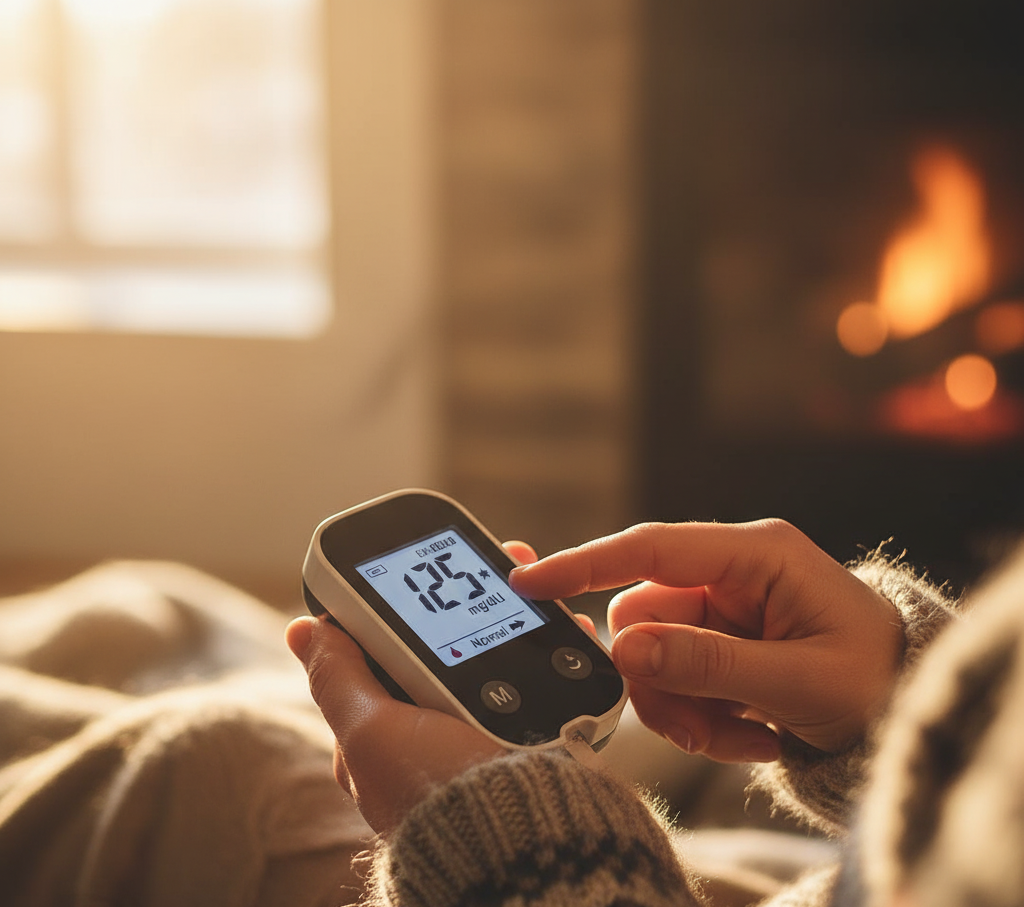Introduction
Every year on 14 November, the world observes World Diabetes Day, a global event dedicated to raising awareness about diabetes, promoting early diagnosis, and improving access to care. In India, where diabetes affects millions of people across all age groups, this day holds special significance. It serves as a reminder to focus on better management, healthier habits, and regular monitoring—especially during changing seasons.
As winter arrives, people with diabetes face unique challenges. The cold weather affects the body in various ways that can influence blood sugar levels, carbohydrate metabolism, appetite, physical activity, and insulin sensitivity. Many individuals report higher blood sugar levels during winter due to decreased exercise, increased cravings for high-calorie foods, and a greater risk of infections. Winter dryness and reduced circulation can also increase the chances of foot problems, numbness, and skin issues.
This detailed guide, specially created for an Indian audience, explains everything you need to know about surviving winter with diabetes. You’ll learn how the cold affects your body, what lifestyle changes can help, how to protect yourself from seasonal fluctuations, which foods are winter-friendly, when to see a doctor, and how to stay safe and healthy throughout the season.
Our goal is simple: to empower you with clear, practical, patient-friendly information so you can stay in control of your diabetes all winter long.

Understanding Diabetes
Diabetes is a long-term condition where the body cannot manage blood sugar levels properly. The hormone responsible for controlling sugar is insulin, which is produced by the pancreas. In diabetes, the body either doesn’t make enough insulin, cannot use insulin effectively, or both.
The main types include:
Type 1 Diabetes
An autoimmune condition where the pancreas stops producing insulin. People with Type 1 require lifelong insulin.
Type 2 Diabetes
The most common type in India. The body becomes insulin-resistant or does not produce enough insulin. Lifestyle changes and medication usually help manage it.
Gestational Diabetes
Occurs during pregnancy and usually resolves after childbirth, but increases future diabetes risk.
Regardless of the type, stable blood sugar levels are essential for preventing long-term complications affecting the heart, nerves, kidneys, eyes, and blood vessels.
Why Winter Is a Challenging Season for People With Diabetes
Winter affects the body in multiple ways, making diabetes management more demanding. Understanding these seasonal challenges can help you prepare better.
Cold Temperature Slows Blood Circulation
Lower temperatures constrict blood vessels, making circulation sluggish. This affects how fast insulin works, sometimes delaying its absorption.
People Exercise Less
Cold weather discourages outdoor physical activity. Shorter days mean fewer opportunities to walk, run, or cycle. When activity drops, blood sugar rises.
Comfort Foods Increase Sugar Levels
Winter brings tempting foods like gajar ka halwa, parathas, peanuts, fried snacks, jaggery-based sweets, and heavy curries. Although tasty, these foods are high in carbs and fats.
Seasonal Infections Raise Blood Sugar
Cough, cold, flu, and throat infections are more common in winter. When the body fights infection, glucose levels increase.
Hydration Levels Fall
People tend to drink less water in colder weather. This can thicken the blood and raise sugar concentration.
Stress and Sleep Changes
Keeping warm, adjusting routines, and reduced sunlight may affect sleep and stress levels, which influence blood sugar.
Foot Problems Become More Common
Cold weather reduces blood flow to the feet, increasing the risk of cracks, dryness, numbness, and infections.
Winter-Related Causes of Blood Sugar Fluctuations
Reduced Activity Levels
One of the biggest contributors to winter fluctuations is the fall in physical activity.
Increased Calorie Consumption
Winter cravings often lead to overeating or increased carbohydrate intake.
Hormonal Shifts
The body releases more cortisol in cold weather, which increases blood sugar.
Seasonal Aches and Pains
Joint stiffness or body aches may reduce mobility, further affecting sugar control.
Lack of Sun Exposure
Lower sunlight exposure affects Vitamin D levels, which are important for insulin sensitivity.
Symptoms That May Worsen During Winter
Certain diabetes symptoms may feel stronger or more frequent in winter:
-
Tiredness or fatigue
-
Sudden hunger or food cravings
-
Excessive thirst
-
Frequent urination
-
Tingling, numbness, or burning in hands and feet
-
Dry, cracked skin
-
Itching, rashes, or irritation
-
Slow healing of cuts
-
Sudden changes in vision
-
Feeling colder than usual
If any of these symptoms worsen, it might be a sign of fluctuating blood sugar levels.
ALSO READ: 10 Health Problems You Should Never Ignore After 30

Winter-Friendly Monitoring and Diagnostic Tips
Blood sugar monitoring becomes even more important in winter.
Check Your Sugar More Frequently
Because winter can cause sudden changes, checking sugar 2–4 times a day (or as advised by your doctor) helps maintain control.
Warm Your Hands Before Testing
Testing with cold fingers can give inaccurate readings.
Watch for Patterns
Notice if your numbers rise after certain foods or fall after activity. Adjust accordingly with your doctor’s guidance.
Routine Lab Tests
Your doctor may recommend:
-
HbA1c every 3–6 months
-
Kidney function tests
-
Cholesterol check
-
Thyroid screening
-
Annual eye exam
-
Diabetic foot exam
Managing Diabetes in Winter: A Complete Guide
To manage diabetes effectively in winter, focus on diet, exercise, medications, hydration, skin care, and regular monitoring.
Winter Diet for People With Diabetes
Food choices make a big difference in winter sugar control.
Best Winter Foods
-
Bajra roti, jowar roti, ragi roti
-
Moong dal, masoor dal, rajma, chole
-
Spinach, methi, mustard greens
-
Carrots, radish, beets, cabbage
-
Mushrooms, broccoli, peas
-
Chicken, fish, eggs (protein-rich)
-
Clear soups, vegetable soups
-
Herbal teas like ginger, tulsi, cinnamon
-
Warm water with lemon
Healthy Snacks
-
Roasted chana
-
Greek yogurt
-
Boiled eggs
-
Nuts (small portions)
-
Fruit salads (low GI fruits)
Foods to Limit
-
Fried snacks
-
Sugary tea or coffee
-
Gajar ka halwa
-
Pakoras, samosas
-
White rice
-
Sweet potatoes in excess
-
Jaggery-based sweets
Hydration Matters
-
Drink warm water throughout the day
-
Avoid sugary beverages
-
Include soups and broths
Winter Exercise Tips for Better Sugar Control
Even 20–30 minutes of activity can help significantly.
Indoor Exercise Options
-
Brisk walking indoors
-
Stair climbing
-
Yoga
-
Pilates
-
Surya namaskar
-
Jump rope
-
Dance workouts
-
Light strength training
Outdoor Exercise Tips
-
Wear layered clothing
-
Cover your head, ears, and hands
-
Warm up before stepping out
-
Avoid the coldest part of the day
Benefits of Winter Exercise
-
Better blood circulation
-
Improved insulin sensitivity
-
Reduced stress
-
Better weight management
-
Lowered cholesterol
Medication and Insulin Care During Winter
Cold temperatures affect how medication and insulin work.
Important Tips
-
Store insulin at 2–8°C
-
Never freeze insulin
-
Keep glucometer strips dry and at room temperature
-
Avoid leaving insulin pens in cars or near heaters
-
Carry snacks if you take medicines that may cause hypoglycemia
When to Adjust Medication
Only adjust medication under doctor supervision. Winter changes may require dose adjustments.
Foot Care Tips for Winter
Foot problems increase during winter due to dryness, poor circulation, and nerve-related changes.
Essential Foot Care Routine
-
Wash feet with lukewarm water
-
Dry them completely
-
Moisturize daily (avoid cream between toes)
-
Wear warm socks
-
Avoid walking barefoot
-
Inspect feet daily
-
Trim nails carefully
-
Avoid using hot water bottles on feet
Consult a doctor if you notice redness, swelling, blisters, cracks, or wounds.
Preventive Tips for Better Diabetes Control in Winter
-
Drink plenty of water
-
Eat small, frequent meals
-
Avoid overeating comfort foods
-
Wear warm clothing
-
Reduce stress with meditation
-
Maintain regular sleep
-
Avoid smoking and alcohol
-
Get flu vaccination if advised
-
Use sunscreen—a winter must
-
Keep indoor air moist to avoid dry skin

When to See a Doctor
Seek immediate medical help if:
-
Blood sugar stays above 250 mg/dL
-
Sugar falls below 70 mg/dL frequently
-
You develop fever or infection
-
You notice foot wounds, cuts, or numbness
-
You have chest pain
-
You experience shortness of breath
-
You develop confusion or extreme weakness
Timely care prevents complications.
Possible Complications of Poor Winter Diabetes Care
Neglecting winter care can lead to:
-
Severe hyperglycemia
-
Severe hypoglycemia
-
Diabetic ketoacidosis (DKA)
-
Worsening neuropathy
-
Foot ulcers and infections
-
Dehydration
-
Increased heart strain
-
Pneumonia or flu complications
-
Kidney load
-
Higher HbA1c levels
Proper precautions greatly reduce these risks.
50 FAQs on Diabetes and Winter Care
-
Why does blood sugar rise during winter?
Cold weather reduces physical activity and increases cravings, raising sugar levels. -
Can winter cause low blood sugar too?
Yes, skipped meals or medication changes can cause low sugar. -
Does insulin work differently in cold weather?
Yes, slow circulation may slow insulin absorption. -
Should diabetics drink warm water in winter?
Yes, it improves hydration and digestion. -
Are winter infections dangerous for diabetics?
Yes, infections can raise sugar and cause complications. -
Can I walk outside in winter?
Yes, but dress warmly and avoid early mornings. -
Is gajar ka halwa safe for diabetics?
Only in very small portions or sugar-free versions. -
Do diabetics need flu shots in winter?
Yes, if recommended by a doctor. -
Is it normal to feel more hungry in winter?
Yes, the body uses more energy to stay warm. -
Can dehydration raise sugar levels?
Yes, it thickens the blood and increases glucose. -
Are oranges safe in winter for diabetics?
Yes, in moderate portions due to their fibre content. -
Is jaggery better than sugar?
No, both raise blood sugar. -
Can diabetics eat peanuts in winter?
Yes, in limited quantities. -
Is hot chocolate allowed?
Only sugar-free, low-calorie versions. -
Does winter affect HbA1c levels?
Often yes, due to lifestyle changes. -
Can diabetics travel safely in winter?
Yes, with proper planning. -
Does cold worsen neuropathy?
Yes, nerve pain may increase. -
Are sweet potatoes safe?
Yes, in moderate portions. -
Can skipping meals be harmful?
Yes, it may cause dangerous sugar swings. -
Is honey safe for diabetics?
Not recommended, it raises sugar. -
Can diabetics drink tea in winter?
Yes, without sugar. -
Is banana safe in winter?
Better choose low GI fruits like apple or orange. -
Does stress increase sugar in winter?
Yes, stress hormones affect glucose. -
Can diabetics take chyawanprash?
Only sugar-free options. -
Are soups healthy for diabetics?
Yes, especially vegetable or chicken clear soup. -
Are heating pads safe?
Use cautiously due to risk of burns. -
Does winter increase cholesterol?
Yes, due to heavier diets. -
Can diabetics eat parathas?
Yes, whole wheat and minimal oil. -
Is room heater use safe?
Yes, but avoid excessive dryness. -
Are mushrooms good for diabetics?
Yes, low in calories and carbs. -
Can diabeteics use energy drinks?
Avoid sugary ones. -
Is indoor walking effective?
Yes, it helps lower sugar levels. -
Can I drink milk at night?
Yes, low-fat and unsweetened. -
Does Vitamin D affect diabetes?
Yes, low levels reduce insulin sensitivity. -
Can diabetes cause joint pain?
Yes, nerve and circulation issues may contribute. -
Is methi good for diabetes?
Yes, it may help with sugar control. -
Are dates allowed?
Avoid or consume rarely. -
Does winter cause more sugar cravings?
Yes, due to hormonal changes. -
Is meditation helpful for diabetics?
Yes, it reduces stress-related sugar spikes. -
Can diabetics eat dark chocolate?
Yes, in very small amounts. -
Does drinking less water raise sugar?
Yes, dehydration increases glucose. -
Can diabetics take steam inhalation?
Yes, safe and helpful for congestion. -
Is ragi healthy for diabetics?
Yes, it is fibre-rich and nutritious. -
Can diabetic foot worsen in winter?
Yes, due to dryness and poor circulation. -
Can diabetics use moisturizers?
Yes, daily moisturizing is recommended. -
Are eggs good for diabetics?
Yes, they are protein-rich. -
Is fasting safe in winter?
Consult a doctor before fasting. -
Can diabetics drink coconut water?
In moderation and only when sugar is stable. -
Can winter depression affect diabetes?
Yes, mood changes can affect eating and sugar. -
What is the best winter diabetes strategy?
Balanced diet, hydration, exercise, routine monitoring, and timely medical advice.
Conclusion
Winter can make diabetes management more challenging, but with awareness and preparation, you can stay healthy and in control throughout the season. From choosing warm and nutritious foods to staying active indoors, monitoring sugar levels, protecting your feet, staying hydrated, and managing stress, each step contributes to better diabetes care.
On World Diabetes Day 2025, take the pledge to prioritize your health and make winter a safe season—not a stressful one. Consistency, awareness, and timely action are the keys to preventing complications.
Quickobook CTA
Looking for expert diabetes care?
Book trusted Endocrinologists, Diabetologists, and General Physicians on Quickobook.
Fast appointments. Verified doctors. Easy follow-ups.
Your health is just a click away.
Disclaimer:
This article is for educational purposes only and should not replace medical advice. Always consult a qualified doctor for personalized diabetes treatment and management.










Comments (0)
No comments yet. Be the first to share your thoughts!
Leave a Comment